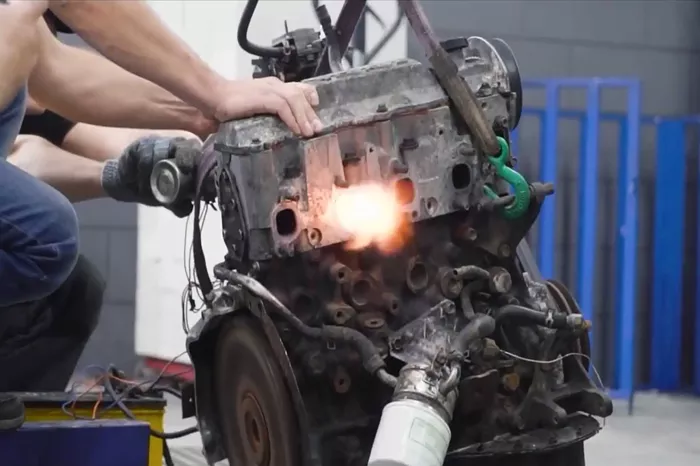Gasoline and diesel engines are designed for specific types of fuel, and each type of engine has unique requirements and mechanisms. The notion of using diesel in a gasoline engine raises many questions and concerns. This article explores whether a gasoline engine can run on diesel, the consequences of using the wrong fuel, and what to do if diesel is mistakenly used in a gasoline engine.
Understanding Gasoline and Diesel Engines
Gasoline Engines
Gasoline engines are designed to operate on petrol (gasoline). These engines use spark plugs to ignite the air-fuel mixture in the combustion chamber. The process is known as spark ignition. Gasoline engines are known for their high-speed operation and efficiency at high revolutions per minute (RPM).
Spark Ignition: Relies on spark plugs to ignite the air-fuel mixture.
High RPM Efficiency: Performs well at higher speeds and is suitable for most passenger vehicles.
Fuel Characteristics: Gasoline is more volatile and evaporates quickly, aiding in the combustion process.
Diesel Engines
Diesel engines operate on diesel fuel, which is denser and less volatile than gasoline. These engines use compression ignition, where the air is compressed to a high pressure and temperature, causing the diesel fuel to ignite spontaneously when injected into the combustion chamber.
Compression Ignition: No spark plugs; ignition is due to high pressure and temperature.
Torque and Efficiency: Diesel engines produce more torque and are more fuel-efficient, particularly at lower RPMs.
Fuel Characteristics: Diesel has higher energy content per gallon and provides better fuel economy.
What Happens if Diesel is Used in a Gasoline Engine?
Immediate Effects
When diesel is introduced into a gasoline engine, several immediate issues arise due to the fundamental differences between the fuels and the engine designs.
Ignition Problems: Diesel is less volatile and doesn’t evaporate as easily as gasoline, making it difficult for the spark plugs to ignite the mixture.
Misfiring and Knocking: The engine may experience severe misfiring and knocking due to improper combustion, causing potential damage.
Exhaust Smoke: Diesel doesn’t burn as cleanly as gasoline, leading to excessive black smoke from the exhaust.
Long-Term Consequences
Prolonged use of diesel in a gasoline engine can cause significant damage, impacting various components and leading to costly repairs.
Engine Damage: Components like pistons, cylinders, and spark plugs can be damaged due to improper combustion and lubrication.
Fuel System Contamination: Diesel can contaminate the fuel system, including the fuel pump and injectors, leading to blockages and reduced efficiency.
Catalytic Converter Issues: The unburnt diesel can clog the catalytic converter, affecting its performance and leading to expensive replacements.
Why Diesel Cannot Replace Gasoline
Chemical Properties
The chemical properties of diesel and gasoline are fundamentally different, influencing their behavior in engines.
Volatility: Gasoline is more volatile, which helps it mix with air and ignite easily. Diesel’s lower volatility makes it unsuitable for spark ignition.
Energy Density: Diesel has a higher energy density, which is beneficial for diesel engines designed to handle it but can cause excessive strain on gasoline engines.
Engine Design
Engines are specifically designed to handle the properties of their intended fuel, and using the wrong fuel can disrupt their operation.
Compression Ratio: Diesel engines have a higher compression ratio than gasoline engines, which affects how the fuel ignites and burns.
Fuel Injection System: The fuel injection systems in gasoline and diesel engines are tailored to the specific requirements of each fuel type.
See also: Diesel Fuel Vs Gasoline: Which Is More Efficient?
Steps to Take if Diesel is Put in a Gasoline Engine
Immediate Action
If diesel is mistakenly added to a gasoline engine, immediate steps should be taken to minimize damage.
Do Not Start the Engine: Starting the engine can circulate the diesel fuel through the system, causing more damage.
Drain the Fuel Tank: Remove the diesel fuel from the tank as soon as possible.
Flush the Fuel System: Clean the fuel lines, fuel pump, and injectors to remove any residual diesel.
Professional Assistance
Seeking professional help is crucial to ensure all traces of diesel are removed and any damage is assessed.
Inspection: A professional mechanic should inspect the engine and fuel system for any damage.
Repairs and Replacements: Replace any damaged components, such as spark plugs or the catalytic converter, to restore the engine’s functionality.
Preventing Fuel Mix-Ups
Labeling and Awareness
Preventing fuel mix-ups requires proper labeling and awareness.
Clear Labeling: Ensure fuel caps and dispensers are clearly labeled to avoid confusion.
Driver Awareness: Educate drivers on the importance of using the correct fuel for their vehicle.
Fuel Cap Locking Mechanisms
Using fuel cap locking mechanisms can prevent accidental refueling with the wrong fuel.
Lockable Fuel Caps: These can be installed to ensure only authorized personnel can refuel the vehicle, reducing the risk of mistakes.
Conclusion
Using diesel in a gasoline engine is highly detrimental and should be avoided at all costs. The fundamental differences between gasoline and diesel, both in terms of chemical properties and engine requirements, make them incompatible. Immediate action and professional assistance are crucial if diesel is mistakenly used in a gasoline engine to prevent severe damage.
Related topic:
Will Diesel Fuel Kill Weeds? [Revealed]

